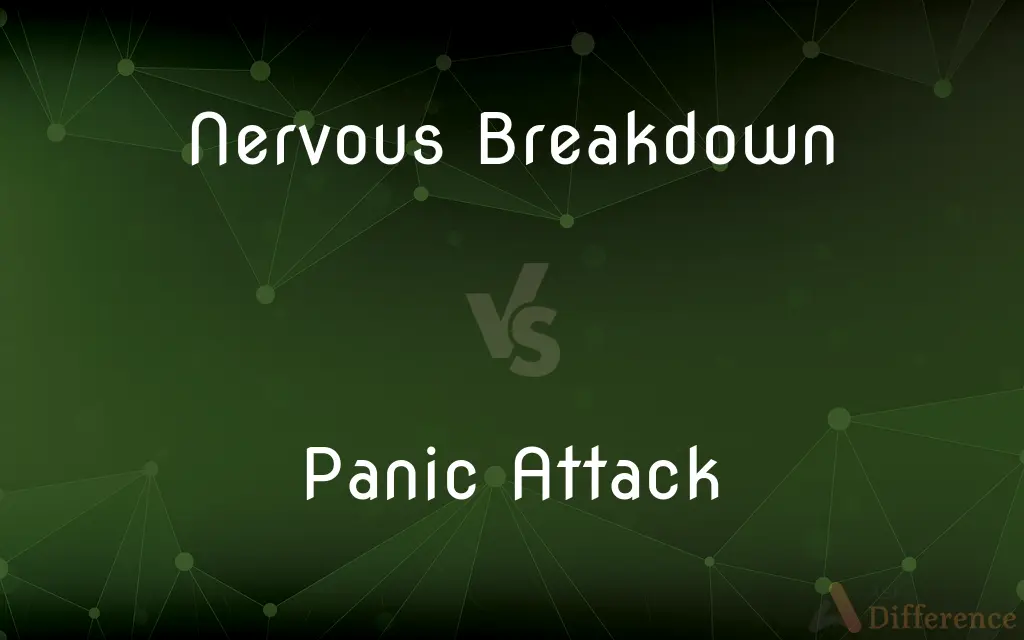Nervous Breakdown vs. Panic Attack — What's the Difference?
By Tayyaba Rehman — Published on November 22, 2023
A Nervous Breakdown is an informal term describing severe mental distress hindering daily functioning, while a Panic Attack is a sudden episode of intense fear with physical and psychological symptoms.

Difference Between Nervous Breakdown and Panic Attack
Table of Contents
ADVERTISEMENT
Key Differences
The terms "Nervous Breakdown" and "Panic Attack" both pertain to psychological stress and distress but represent different concepts.
A Nervous Breakdown, not a clinical term, generally refers to a period where someone becomes emotionally overwhelmed and cannot maintain their regular activities. In contrast, a Panic Attack is a distinct, acute episode of severe anxiety marked by specific symptoms and can be clinically diagnosed.
It's crucial to differentiate between these terms when discussing mental health.
While Nervous Breakdown is more of a colloquial expression denoting a prolonged period of mental distress, Panic Attack describes an immediate and intense episode of fear or discomfort, often peaking within minutes.
Both experiences, though different, can be distressing and debilitating.
ADVERTISEMENT
A person undergoing a Nervous Breakdown might feel they're losing control, unable to cope with life's demands. Simultaneously, someone experiencing a Panic Attack might feel chest pain, palpitations, or a fear of dying, even when there's no real danger present.
Understanding the difference can guide appropriate responses and treatments.
A Nervous Breakdown might require extended therapy, lifestyle adjustments, or medication to address underlying issues. A Panic Attack might necessitate strategies to manage and prevent recurrent attacks, cognitive-behavioral therapy, or even medications.
Comparison Chart
Definition
Informal term for severe mental distress
Clinically-defined sudden episode of intense fear
Duration
Can last for extended periods
Typically acute, peaking within minutes
Symptoms
Vary widely, often encompassing emotional exhaustion
Specific set, including rapid heartbeat, shortness of breath
Clinical Recognition
Not a clinical term or diagnosis
Recognized and diagnosable in clinical settings
Common Treatments
Therapy, lifestyle adjustments, medications
Cognitive-behavioral therapy, panic management techniques, medications
Compare with Definitions
Nervous Breakdown
Severe emotional strain resulting in an inability to cope with daily life.
The traumatic event was the trigger for his Nervous Breakdown.
Panic Attack
A sudden bout of intense fear or discomfort that peaks quickly.
During the interview, she felt a Panic Attack coming on and had to excuse herself.
Nervous Breakdown
An overwhelming state of emotional turmoil affecting daily functioning.
Constant stress without relief led him to a Nervous Breakdown.
Panic Attack
An acute manifestation of extreme anxiety, often without an obvious trigger.
Crowded places can sometimes induce a Panic Attack in vulnerable individuals.
Nervous Breakdown
A point where emotional and mental stress become unmanageable.
She took a leave of absence from work after her Nervous Breakdown.
Panic Attack
A sudden and intense episode of overwhelming anxiety and fear.
Out of nowhere, she experienced a Panic Attack while shopping.
Nervous Breakdown
A non-clinical term for a period of significant mental distress.
After months of overwork, Jane felt like she was on the brink of a Nervous Breakdown.
Panic Attack
A short-lived episode characterized by physical and psychological symptoms of severe anxiety.
He had his first Panic Attack during a flight.
Nervous Breakdown
A metaphorical "break" in mental stability due to overwhelming stress.
With all the pressures at home and work, a Nervous Breakdown seemed imminent.
Panic Attack
An overwhelming feeling of dread and anxiety that arises abruptly.
The sensation of his heart racing was the first sign of a Panic Attack.
Common Curiosities
Can you have a Panic Attack without a specific reason?
Yes, Panic Attacks can sometimes occur without an obvious trigger.
Is a Nervous Breakdown a medical diagnosis?
No, it's an informal term, not a recognized clinical diagnosis.
Can Panic Attacks be prevented?
With appropriate therapy and strategies, the frequency and severity of attacks can be reduced.
How long does a Panic Attack last?
Typically, it peaks within minutes and subsides within 20-30 minutes.
Is a Nervous Breakdown the same as depression?
No, while there may be overlapping symptoms, they are distinct concepts.
How can one cope with a Nervous Breakdown?
Therapy, medication, and lifestyle changes, such as stress reduction, can help.
What might trigger a Nervous Breakdown?
Prolonged stress, traumatic events, or significant life changes can be potential triggers.
How common are Panic Attacks?
They're relatively common, with many individuals experiencing at least one in their lifetime.
Are Panic Attacks dangerous?
While distressing, they're not typically dangerous. However, symptoms can mimic serious conditions, so a doctor's consultation is recommended.
Can children experience a Nervous Breakdown?
While the term is not typically used for children, they can experience severe mental distress.
Can you predict when a Panic Attack will occur?
They can be unpredictable, but some people might recognize potential triggers or warning signs.
Can breathing exercises help during a Panic Attack?
Yes, deep breathing can help counteract hyperventilation and provide a calming effect during an attack.
Is it possible to have multiple Panic Attacks in a day?
Yes, some individuals might experience multiple episodes in a short period.
Should someone seek help after a Nervous Breakdown?
Yes, seeking professional help can offer coping strategies and support for recovery.
Can ongoing Panic Attacks lead to a Nervous Breakdown?
Chronic anxiety, including frequent Panic Attacks, could contribute to severe mental distress akin to what's colloquially termed a Nervous Breakdown.
Share Your Discovery

Previous Comparison
Siberian Husky vs. Alaskan Malamute
Next Comparison
Soft Skills vs. Technical SkillsAuthor Spotlight
Written by
Tayyaba RehmanTayyaba Rehman is a distinguished writer, currently serving as a primary contributor to askdifference.com. As a researcher in semantics and etymology, Tayyaba's passion for the complexity of languages and their distinctions has found a perfect home on the platform. Tayyaba delves into the intricacies of language, distinguishing between commonly confused words and phrases, thereby providing clarity for readers worldwide.













































